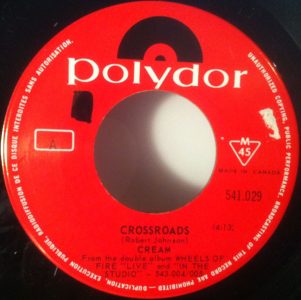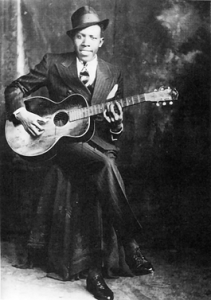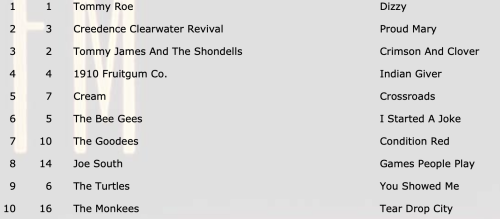#27: Crossroads by Cream
City: Edmonton, AB
Radio Station: CHED
Peak Month: March 1969
Peak Position in Edmonton: #5
Peak position in Vancouver ~ #8
Peak Position on Billboard Hot 100 ~ #28
YouTube: “Crossroads”
Lyrics: “Crossroads”
Peter Edward “Ginger” Baker was born in 1939 in South London. He excellent at British football in his teens. At age fifteen he began to play drums and took lessons from iconic British jazz drummer Phil Seaman. In 1962 Baker joined Blues Incorporated along with Jack Bruce and others who played at the London Blues and Barrelhouse Club. In 1963, Baker was one of the founding members of a jazz/rhythm & blues band, called The Graham Bond Organisation, spelled the British way. Jack Bruce also joined the band. The band appeared in the 1965 UK film Gonks Go Beat, which also featured Lulu and the Nashville Teens.
John Symon Asher Bruce was born in 1943 in Lanarkshire, the lowlands of Scotland. He learned to play the cello in high school and played in school jazz bands. After leaving school he toured Italy, playing double bass with the Murray Campbell Big Band. While they were in several bands together, Baker and Bruce didn’t get along very well. And in 1965, Jack Bruce left The Graham Bond Organisation for John Mayall & the Bluesbreakers. It was with this band that Bruce met Eric Clapton.
Eric Patrick Clapton was born in 1945 in Ripley, Surrey, 25 miles southwest of London. He was given a guitar for his thirteenth birthday. By age sixteen he was busking with his guitar in the West End of London, and several suburbs. When he turned seventeen Clapton joined a band called the Roosters. An opportunity to join the Yardbirds came in October 1963, and Eric jumped at the invitation. Clapton stayed with the Yardbirds to record their first major hit “For Your Love”, in early 1965. Due to a more pop-music oriented direction, Clapton left the Yardbirds to briefly join John Mayall & the Bluesbreakers. But Clapton was still not settled. In 1965, he collaborated with Jimmy Page and others billed as The Immediate All Stars. In 1966, he went on with Jack Bruce and Steve Winwood to form Eric Clapton and the Powerhouse. In July 1966, Eric Clapton was invited by Ginger Baker to join him with Jack Bruce to be part of their new band called Cream.
In their lineup, Jack Bruce provided lead and backing vocals, bass guitar, keyboards, piano, harmonica, cello and acoustic guitar. Eric Clapton provided lead and rhythm guitars, backing and lead vocals. And Ginger Baker anchored the band with drums, percussion, backing and lead vocals. In 1966 Cream performed 74 concerts. In the fall of 1966, Cream went to the recording studio and in December 1966 released their debut album, Fresh Cream. Though it was not included on the UK pressing, the first track on Side One of the North American album was a song titled “I Feel Free”.
As “I Feel Free” was climbing the pop chart on CKLG in Vancouver, Cream went to the studio and recorded Disraeli Gears. The album became a huge breakthrough for the band across North America in the winter of 1967-68. Cream was also involved in a grueling schedule of 172 concert and TV appearances. in 1967. Disraeli Gears topped the album charts in Australia and Finland, and climbed to #4 in the USA. In 1999 Disraeli Gears was given a Grammy Hall of Fame award for Historical/Lasting Rock Album. The hit single from the album, “Sunshine Of Your Love” peaked at #5 on the Billboard Hot 100, #1 in Hamilton (ON), Toronto and Edmonton (AB), and #2 in Calgary (AB) and Windsor (ON). But in Vancouver the single didn’t make the pop chart.
On June 2, 1968, Cream performed in concert at the Pacific Coliseum in Vancouver. In July Cream made an official announcement that the band would breakup after the current tour of North America was over. Between January and June 1968, Cream had given ninety performances. Then, in August 1968 Cream released a double album titled Wheels Of Fire. The album topped the US and Canadian album charts, and peaked at #2 in France and #3 in the UK. The album included two hit singles, “White Room” and “Crossroads.”

“Crossroads” is a song written by blues singer Robert Johnson in 1936. He was born in Hazelhurst, Mississippi, in 1911. He learned to play the harmonica and the jaw harp at an early age. He learned to play guitar and was married at the age of seventeen in February 1929 to 16-year-old Virginia Travis. Soon after they were wed, she died in childbirth. He moved to Martinsville, Virginia in 1930. While living in Martinsville, Johnson fathered a child with Vergie Mae Smith. He married Caletta Craft in May 1931. In 1932, the couple settled for a while in Clarksdale, Mississippi, in the Delta. But Johnson soon left for a career as a “walking” or itinerant musician, and Caletta died in early 1933. He did not marry again but formed some long-term relationships with women to whom he would return periodically. In other places he stayed with whatever woman he was able to seduce at his performance. He used different names in different places, employing at least eight distinct surnames.
From 1932 to 1938 Johnson was an itinerant musician. He mostly played in towns in Mississippi, Arkansas, and Tennessee. But he also travelled to Chicago, Texas, New York, Canada, Kentucky, and Indiana. In 1936 and 1937 Johnson went to recording studios in San Antonio and Dallas, Texas. His most notable recordings include “I believe I’ll Dust My Broom”, “Sweet Home Chicago”, “Terraplane Blues” and “Last Fair Deal Gone Down”. His recording of “Cross Road Blues” was the one Cream covered in 1968.

Robert Johnson in 1936
Robert Johnson died at the age of 27 on August 16, 1938. His death was not reported publicly. The Leflore County registrar, Cornelia Jordan, years later and after conducting an investigation into Johnson’s death for the state director of vital statistics, R. N. Whitfield, wrote a clarifying note on the back of Johnson’s death certificate:
I talked with the white man on whose place this negro died and I also talked with a negro woman on the place. The plantation owner said the negro man, seemingly about 26 years old, came from Tunica two or three weeks before he died to play banjo at a negro dance given there on the plantation. He stayed in the house with some of the negroes saying he wanted to pick cotton. The white man did not have a doctor for this negro as he had not worked for him. He was buried in a homemade coffin furnished by the county. The plantation owner said it was his opinion that the man died of syphilis.
In 2006, a medical practitioner, David Connell, suggested, on the basis of photographs showing Johnson’s “unnaturally long fingers” and “one bad eye”, that Johnson may have had Marfan syndrome, which could have both affected his guitar playing and contributed to his death due to aortic dissection.
A crossroads or an intersection of rural roads is one of the few landmarks in the Mississippi Delta, a flat featureless plain between the Mississippi and Yazoo rivers. It is part of the local iconography and several businesses use the name, such as gas stations, banks, and retail shops. A crossroads is also where cars are more likely to slow down or stop, thus presenting the best opportunity for a hitchhiker. In the simplest reading, Johnson describes his grief at being unable to catch a ride at an intersection before the sun sets: “I went down to the crossroads, tried to flag a ride. Nobody seemed to know me. Everybody passed me by.” The song opens with the protagonist kneeling at a crossroads to ask God’s mercy. The second verse tells of his failed attempts to hitch a ride. In the third and fourth verses, Johnson expresses apprehension at being stranded as darkness approaches. He asks that his friend Willie Brown be advised that “I’m sinkin’ down.”
In 1980, Robert Johnson was posthumously inducted into the Blues Hall of Fame in Memphis. In 1991 the collection of 41 songs by Robert Johnson, titled The Complete Recordings, received a Grammy Award. In 1995 the Rock and Roll Hall of Fame included “Crossroads”/”Cross Road Blues” in its list of the “500 Songs That Shaped Rock and Roll.” In 1998, “Cross Road Blues” was inducted into the Grammy Hall of Fame.
“Crossroads” peaked at #2 in Fort Lauderdale (FL), #3 in Rochester (NY), #5 in Edmonton (AB), Kansas City (MO), Schenectady (NY), and Geneva (NY), #6 in Ottawa, Louisville (KY), Des Moines (IA), and Syracuse (NY), #7 in Saint Charles (MO), and Houston, #8 in Vancouver (BC), San Bernardino (CA), and Santa Rosa (CA), #9 in Kenora (ON), St. Louis, Milwaukee (WI), Tucson (AZ), and Los Angeles, and #11 in Wilkes-Barre (PA).
Cream was persuaded to go back to the studio to make one more album. The outcome was the Goodbye album released in February 1969. It topped the UK album charts and climbed to #2 on the Billboard 200 album chart. The single release from the album was “Badge”.
Cream split in early 1969, which happened to coincide with the breakup of Traffic. Clapton and Baker from Cream, joined Steve Winwood and Ric Grech from Traffic to form Blind Faith. Their self-titled debut album, Blind Faith, proved to be their only trip to the recording studio. The album was one of ten that topped the Billboard 200 album chart in 1969. It was also a huge international seller exceeding 8 million in sales. However, after touring in the summer of ’69, Blind Faith split up that October.
When Blind Faith went on tour in 1969, Clapton invited Delaney & Bonnie to be the opening act. And he also performed with them. After Blind Faith split, Clapton continued to perform with them in Delaney, Bonnie & Friends. In December 1969 Clapton was in the recording studio with Delaney and Bonnie Bramlett, George Harrison, Rita Coolidge, Dave Mason and others. The outcome was an album titled On Tour with Eric Clapton, which included the hit single “Only You Know And I Know”. Clapton also appeared on their sixth album released in 1972 titled D&B Together. Concurrently, in 1970 Eric Clapton formed Derek and the Dominos. They released “Layla” from their sole studio album in 1970. Initial sales were weak. However, the song became Top Ten hit in 1972, despite its length of seven minutes and eight seconds. “Layla” climbed into the Top Ten in Canada, Ireland, Japan, Netherlands, New Zealand, Poland, the UK and USA. It had its best chart run in Puerto Rico where it peaked at #1. The song won Eric Clapton a Grammy Hall of Fame award in 1998 for a Historical/Lasting Rock Single. The 1970 album Layla and Other Assorted Love Songs also won Eric Clapton a Grammy Hall of Fame Award in 2000 for Historical/LastingRock Album.
In addition, Eric Clapton pursued a solo career. In 1970 he released a self-titled debut album which included the single “After Midnight”. But he struggled with heroin addiction and retreated from the spotlight for a few years. In 1974 he went back to the studio and released 461 Ocean Boulevard. The album gave him a number one hit single “I Shot The Sheriff”, a cover of a 1973 record by Bob Marley. The single won Clapton a Grammy Hall of Fame Award in 2003 as a Historical/Lasting Rock Single. And in 1977, on his fifth studio album, he had success with “Lay Down Sally” and “Wonderful Tonight”. Through the 80s, Eric Clapton was mostly successful on the Mainstream Rock charts. Still, he managed on Top Ten hit on the Billboard Hot 100 that decade with his 1981 release of “I Can’t Stand It”.
But it was the 1990s where Eric Clapton re-emerged to top the pop charts for the first time. In 1991 he penned “Tears In Heaven”. The song was about the death of Clapton’s four-year-old son, Conor. On March 20, 1991, Conor died after falling from the 53rd-floor window of a New York City apartment belonging to a friend of Conor’s mother. The single won Clapton three Grammy Awards in 1993: Record of the Year, Song of the Year and Beset Male Pop Vocal Performance. He also won at the February 1993 Grammys Album of the Year for Unplugged, and Best Rock Song for his acoustic version of “Layla”. At the 1997 Grammys, Clapton won both Record of the Year and Best Male Pop Vocal Performance for “Change The World”. And in “My Father’s Eyes” won him a Grammy Award for Best Male Pop Vocal Performance. Over the decades Eric Clapton has recorded 21 studio albums, released 26 singles and 14 live albums. Eric Clapton has been nominated/considered for 42 Grammy Awards since 1969, and has been awarded 22 Grammy Awards. Among his other awards, Clapton won in the Best Traditional Blues Album category for From The Cradle (1995) and Riding with the King (2001). He also won a Grammy Award for Best Contemporary Blues Album in 2008 for The Road to Escondido. Among his many nominations for a Grammy Award is one for Best Rock Performance by a Duo or Group with Vocal for his 1994 recording of “My Back Pages“.
After Blind Faith split, Ginger Baker formed Ginger Baker’s Air Force, with Steve Winwood, Ric Grech and others. The short-lived jazz-fusion band recorded two albums. Baker established a recording studio in Lagos, Nigeria in 1971 where Paul McCartney and Wings recorded Band On The Run. In 1974 Baker formed Baker Gurvitz Army, a Jazz-Afrobeat band. After one of the Nigerian musicians died in a plane crash in 1976, the band broke up. Through the 1980s, Ginger Baker lived on his olive farm in Tuscany and retreated from music. He also finally kicked a heroin habit he’d developed playing at jazz clubs in London in the mid-60s. In 1993 Baker formed a trio with Jack Bruce and Gary Moore called BBM, who released one album. He had problems with U.S. immigration due to his past drug history. After living in Colorado between 1993 an 1999 he returned to Europe.
Jack Bruce went on to record several solo albums. In 1972 he joined two ex-Mountain bandmates to form West, Bruce & Laing. He formed his own band in 1976 which went under several titles, but ran into financial and health problems due to his drug habit. His recording output was intermittent. Between 1981 and 200o he released just four albums. Although, he continued to record new material, including his 14th studio album in 2014.
At Clapton’s request, Cream reunited for a series of four shows, on May 2nd, 3rd, 5th and 6th, 2005, at the Royal Albert Hall in London. This was the same venue where they performed their final concerts in October 1968. Cream subsequently performed three concerts at Madison Square Gardens in New York City, October 24-26, 2005. Eric Clapton has been given a Grammy Lifetime Achievement Award and made an Officer of the Order of the British Empire, and in 2004 promoted to Commander of the Order of the British Empire.
Ginger Baker released 18 solo albums, his final one being Why in 2014. He died at the age of 80 in 2019 after a series of heart-related illnesses. Jack Bruce died of liver disease in 2014 at the age of 71. In March, 2023, Eric Clapton turned 78.
November 17, 2023
Ray McGinnis
References:
Bob Elliott, “Wheels of Fire to Burn Out: The Gig List 1968,” net space, Australia.
“Cream bassist Jack Bruce dies, aged 71,” BBC, October 25, 2014.
Mark Savage, “Ginger Baker: Legendary Cream drummer dies aged 80,” BBC, October 6, 2019.
Elias Leight, “10 Things We Learned From ‘Eric Clapton: Life in 12 Bars’ Doc,” Rolling Stone, February 9, 2018.
“List of Awards and Nominations Received by Eric Clapton,” Wikipedia.org.
Bruce Conforth and Gayle Dean Wardlow, Up Jumped the Devil: The Real Life of Robert Johnson, Chicago Review Press, 2019.

CHED, 630-AM, Edmonton, AB, March 10, 1969 | Top Ten

Leave a Reply